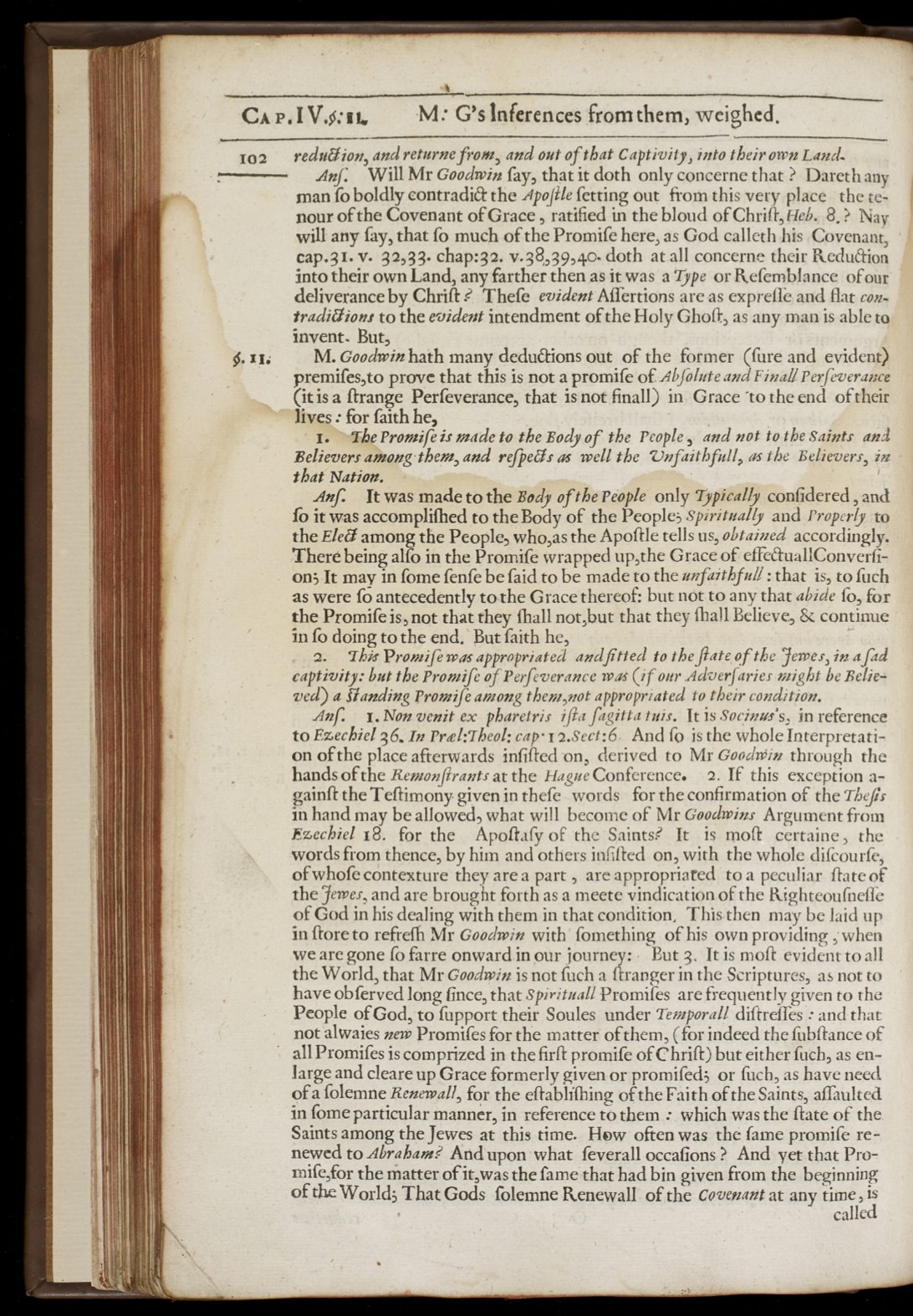

CAP.IV.ß:t4
4
M:
Cs
Inferences
from them, weighed.
102
reduïtion, and
return
from,
and
out
of
that
Captivity, into
their
own
Land.
Anf.
Will Mr
Goodwin
fay,
that
it
doth
only concerne
that
?
Dareth
any
man
fo boldly
contradi&
the
Apoftle
fetting out from
this very place
the
te-
nour
of
the
Covenant
of
Grace
,
ratified
in
the
blond ofChrift,rieb.
8.
?
Nay
will.
any
fay,
that
fo
much
of
the Promife
here,
as
God
calleth
his
Covenant,
cap.3i.
v. 32,33. chap:32.
v38,39,4o.
doth
at
all
concerne their
R.edu
&ion
into their
own Land,
any
farther
then
as
it
was
a Type
or
Refemblance ofour
deliverance by
Chrift?
Thefe
evident Affertions
are expreflèand
flat
con-
tradicions
to
the
evident
intendment
of
the
Holy Ghoft,
as
any man
is
able
to
invent.
But,
Et:
M.
Goodwin
hath
many dedu&ions
out
of
the
former (lure and evident)
premifes,to
prove that
this
is
not
a
promife
of
Abfolute
andFinal/
Perfeverance
(it
is
a
ftrange Perfeverance,
that
is
not
finali)
in
Grace to
the
end
of
their
lives : for faith
he,
t.
The
Promife is made to
the
Body
of
the
People
, and
not
to
the Saints and
Believersamong them,
and
refpeElsas well
the
Vnfaithfull,
as
the
Believers,
in
that
Nation.
Anf.
It
was
made
to
the
Body
of
the
Péople
only
Typically
confidered
,
and
fo
it
was accomplifhed
to the
Body
of
the People;
spiritually and
Properly
to
the Elea
among
the People,
who,as
the
Apoftle tells
us,
obtained accordingly.
There
being
alfo
in
the
Promife wrapped
up,the Grace
of
effe&uallConverfi-
on; It
may
in
fouie fenfe
be
faid
to
be made
to the
unfaithfull
:
that
is,
to
filch
as were
fo
antecedently to-the Grace thereof:
but
not
to
any
that
abide fo,
for
the
Promife is, not
that
they
(hall
not,but that
they
{hall
Believe, &
continue
in
fo
doing
to
the
end. But faith he,
2.
Thin
Promife
was
appropriated
andfitted
to
the
ffate,of
the
7ewes,inafad
captivity:
but the Promife
of
Perfeverance
was
(if
our
Adverfaries
night
be
Belie-
ved)
a
Panding
Promife among
them,not appropriated
to
their
condition.
Anf.
t.
Non
venit
ex pharetris ifla
fagitta
tuffs.
It
is Socinus's,
in reference
to
Ezechiel 36.
In
Prel
:Theol: cap-
s
2.Sect
:6-
And
fo
is
the whole
Interpretati-
on
ofthe
place
afterwards
infifted
on,
derived
to
Mr
Goodwin
through the
hands
ofthe
KemonJtrants
at the
Hague
Conference.
2.
If
this exception a-
gainft the Teftimony given
in
thefe words for
the
confirmation
of
the
Thefts
in hand may
be
allowed, what
will become
of
Mr Goodwin Argument from
Ezechiel
18.
for
the
Apofl
fy
of
the
Saints?
It
is
molt
certaine,
the
words from thence, by
him
and others
inffted on, with the whole
difcourfe,
ofwhofecontexture
they
area
part
,
are appropriated to
a peculiar
flateof
the
fewer,
and are
brought
forth
as a
meete vindication
of
the
Righteoufneffe
of
God
in
his
dealing with them
in
that
condition, This.then may be
laid up
in fiore
to
refrefh
Mr
Goodwin
with
fomething
of
his
own providing ;
when
we are gone
fo
farre onward
in
our
journey:
But
3.
It
is
molt
evident to
all
the World, that
Mr
Goodwin is
not
fuch
a
ftranger
in
the
Scriptures,
as
not to
have obferved long
fince,
that
Spirituali Promifes
arefrequently
given
to the
People
of
God,
to
fupport their
Soules
under
Temporali
diftreffes
:
and-that
not
alwaies
new
Promifes for
the matter
of
them,
(for
indeed the
fubftance
of
all Promifes
is
comprized in
the
firft
promife
of
Chrift)
but
either
filch,
as
en-
large
and cleare up
Grace formerly
given
or
promifed;
or
fuch,
as
have need
óf
a folemne
Kenewall,
for
the
effablifhing
of
the Faith
of
the
Saints,
alfaulted
in
fome
particular manner,
in
reference
to
there :
which
was
the Rate
of
the.
Saints
among
the
Jewes
at
this time. How often
was
the
fame
promife
re-
newed
to
Abraham?
And'upon what feverall
occalions
?
And yet
that
Pro-
mife,for
the matter
of
it,was
the fame
that
had bin givenfrom the
beginning
of
the Worlds
That
Gods folemne Renewall
of
the
Covenant
at
any time
is
called










